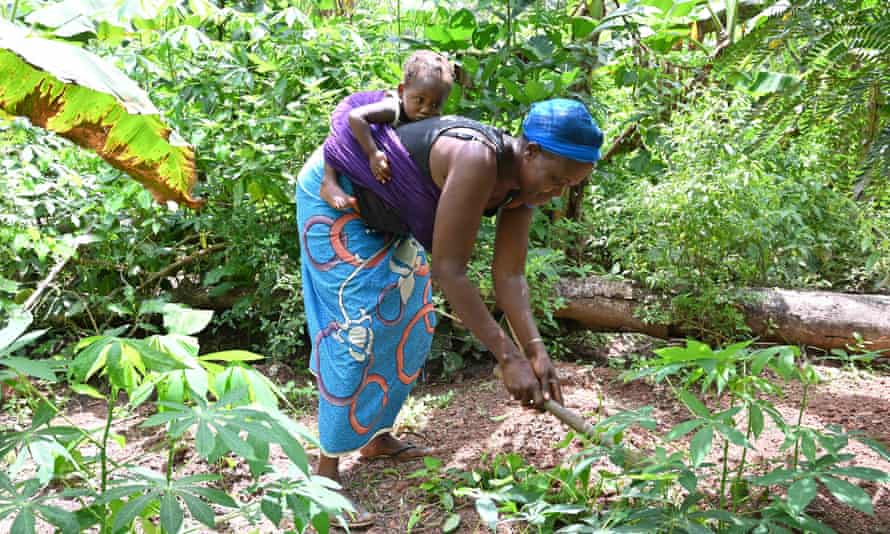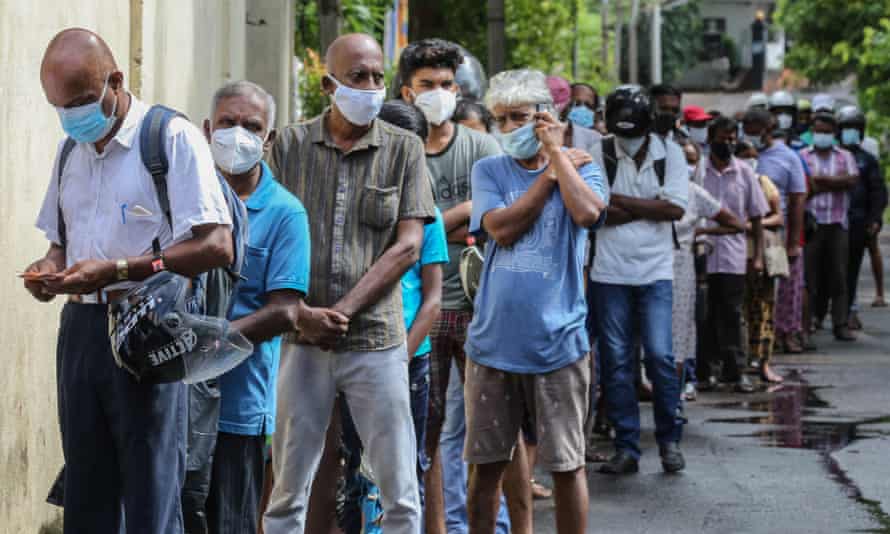‘Corporate colonization’: small producers boycott UN food summit
Small-scale farmers and Indigenous groups say big ag offers only false and self-interested solutions

Last modified on Thu 23 Sep 2021 08.09 EDT
Hundreds of civil society groups, academics and social movements are boycotting the first UN global food summit amid growing anger that the agenda has been hijacked by an opaque web of corporate interests.
Called the people’s summit by UN organisers, groups representing thousands of small-scale farmers and Indigenous communities, which produce 70% of the world’s food through sustainable agriculture, are among those to withdraw from Thursday’s event saying their knowledge and experience has been ignored.
The declaration, signed by about 600 groups and individuals, states: “[We] reject the ongoing corporate colonization of food systems and food governance under the facade of the United Nations Food Systems Summit … The struggle for sustainable, just and healthy food systems cannot be unhooked from the realities of the peoples whose rights, knowledge and livelihoods have gone unrecognized and disrespected.”
Some have criticized the prominence of corporations, such as Nestle, Tyson and Bayer, in the summit’s efforts to identify food system solutions.
About 90 world leaders are expected to attend the summit in New York, with at least 130 countries making pledges on issues like free school meals, reducing food waste, healthy eating, biodata and carbon capture.
The summit, which has taken two years and millions of dollars to organise, was convened ostensibly to garner political commitment to help deliver the Sustainable Development Goals (SDGs) amid growing public criticism of the food industry’s contribution to hunger, malnutrition and obesity, as well as environmental destruction, biodiversity loss and climate chaos.
It was billed as a landmark initiative in which the UN would act as the broker gathering views from a wide range of experts – academics, NGOs, philanthropic donors, farmers, community and Indigenous groups, corporations and business associations – to generate sustainable and equitable solutions.
Yet critics say the role and responsibility of transnational corporations – which dominate every part of the food system, from seeds and pesticides to slaughterhouses, breweries and supermarkets – has not been adequately addressed. Nor have human rights or the pandemic, despite the fact it led to a huge rise in global food insecurity and exposed severe vulnerabilities in the global supply chain.

“The audacity of the UN to keep calling this a people’s summit even as it continues to lose support is arrogant, [as is] pointing to my participation without listening to any of the substantive things I’ve said,” said Michael Fakhri, the UN special rapporteur on the right to food and adviser to the summit.
Fakhri and those boycotting the summit say the UN has given the private sector a dominant role in almost every part of the summit, which will lead to transnational corporations and their allies in the non-profit and philanthropy sectors having greater scope to direct food policies, financing and governance.
As a result, they say solutions will be market-led, piecemeal, voluntary and heavily weighted towards increasing food production through capital investments, big data and proprietary technologies. Critics say that this approach will enable a handful of corporations and individuals to expand control over the global food system to the further detriment of the vast majority of people and the planet.
“The UN has provided a cover of legitimacy for corporations to capture the narrative and deflate public pressure – it has not been an honest broker,” said Sofia Monsalve, secretary general of the Food First Information and Action Network (FIAN), a research and advocacy organization based in Germany.
“The refusal to discuss major issues like concentration in every part of the food system, corporate land grabs, taxation and accountability for human rights means the summit will fail,” Monsalve added.
According to the special rapporteur Fakhri, it took months to persuade organizers to include human rights in discussions, and even then the right to food appears only in the margins. “We see the same corporate players who have caused irreparable damage to our health, climate and environment trying to create a new game, gain more influence and carve out new economic opportunities.”
Agnes Kalibata, special envoy to the summit, vehemently rejected the criticisms. She told the Guardian that farmers, youth groups and academics have been represented in unprecedented numbers, and that those boycotting the event spoke for issues not people. “The summit is not about corporates [sic], it’s about working together to transform the food system and deliver on the SDGs, which are built on human rights … every country has engaged, people were invited and listened to,” she said. “If Michael Fakhri really disagreed, why did he stay?”
But a new analysis published on the eve of the summit suggests non-corporate participants have been sidelined in favour of big corporations represented by and allied with business associations, non-profits and philanthropy groups.
For instance, the summit is broken down into five areas known as action tracks. Those tasked with coming up with solutions to “boost nature positive production”(action track 3) include a single Indigenous group but 26 private sector corporations such as Nestle, Tyson, Bayer and the International Fertilizer Association, according to the research commissioned by a global grassroots campaign opposing the corporate focus.
Yet about 80% of the planet’s remaining biodiversity is located on the territories on Indigenous peoples, who have practised sustainable agriculture for millennia and who along with small-scale farmers are at the forefront in developing agroecology – sustainable modern farming practices that work with nature and communities rather than exploiting them.
Nettie Wiebe from La Via Campesina, a global peasant movement representing small farmers, rural workers and Indigenous farmers, said her organisation withdrew and started organising against the summit because it was “deeply undemocratic, unaccountable and dismissive of those without wealth and power”.
“The big ag solutions being promoted undermine what the vast majority of the world’s food producers are trying to do to protect the environment and cool down the climate so that there is hope for the future.”
The analysis also found that influential business associations, thinktanks and philanthropies which represent, finance and promote corporate interests in sectors like agriculture, retail and finance, were given important leadership roles.
The World Economic Forum, a corporate-funded transnational organization of business, political, intellectual and civil society leaders (popularly known as Davos), has played a driving role in the summit while working to unlock $90tn in new investments and infrastructure. So has the World Business Council on Sustainable Development – an international CEO-led coalition promoting the idea that corporations and wealthy elites can solve climate change and environmental degradation caused by extractivism.
The Bill and Melinda Gates Foundation, a strong advocate of biotech-based solutions for food insecurity, is linked to several summit participants with corporate ties. It co-founded and helps fund the Alliance for a Green Revolution in Africa (Agra), which promotes the spread of industrialized agriculture in the continent. The president of Agra, which has close ties to the agrochemical industry, is the summit’s special envoy, Kalibata.
“This corporate juggernaut must be stopped, or we risk deepening environmental injustice and human rights violations,” said Kirtana Chandrasekaran, co-author of the report and food sovereignty programme coordinator at Friends of the Earth International. “Hiding behind their associations and business platforms, powerful corporate actors are directing policymaking, financing, narratives and science in the summit … agribusiness, fossil fuel and tech giants are promoting market-led false solutions that are designed to increase profits and tighten their stranglehold on food systems.”
Kalibata denied that grassroots groups and poor countries have struggled to be heard and said the private sector was vital to solving the crises in the food system. “I want them to fix the problems they are causing – we need their help with solutions.”
